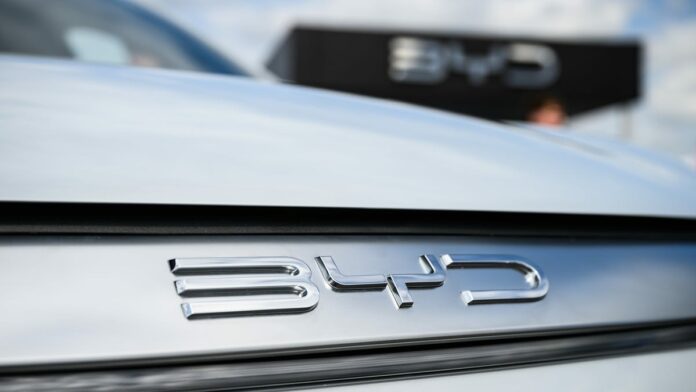Chinese electric vehicle maker BYD announced its latest ultra-cheap car on Wednesday as it continues accelerating a price war in its home country.
The Shenzhen-based company, which has been backed by the likes of Warren Buffett’s Berkshire Hathaway, said the updated version of its e2 EV hatchback will be priced at 89,800 yuan ($12,485), 12.6% less than the previous price of 102,800 yuan ($694). It’s just the latest new model unveiled by BYD over the past month as the automaker looks to retain its dominance in China’s EV market and maintain its aggressive stance against Tesla.
BYD earlier this month unveiled a new “supercar” — the $233,000 Yangwang U9 — as part of its push to conquer the high-end EV market. It’s also launched a 12% cheaper version of its best-selling Yuan Plus crossover and an updated version of its most affordable EV — the Seagull — with a 5% cheaper price tag.
The rapid introduction of new models — and price cuts — has spurred a price war in China as rival automakers look to maintain their place in the crowded market. Tesla and several other companies, including Hyundai Motor and the General Motors-backed joint venture SAIC-GM-Wuling, retaliated with their own price cuts or increased incentives.
“BYD appears to be extremely aggressive in driving a transition from petrol cars to EVs in the country’s automotive industry,” Eric Han, a senior manager at Shanghai-based advisory firm Suolei, told the South China Morning Post. “The cheap models will also draw middle-income consumers who have become price sensitive amid a bearish economic outlook.”
But BYD’s rapid growth at home hasn’t translated as successfully to success abroad, despite the company’s success in overtaking Tesla as the top global seller of EVs last year.
International woes
Executives at the company have complained about issues like weak market demand, exorbitant prices, and internal tension over how quickly BYD should chase success in the European market, according to The Wall Street Journal. Plus, the company’s inexperience has led to thousands of vehicles piling up in European — and Chinese — warehouses. Executives also told the news publication that it was unlikely to achieve BYD’s internal target of selling 400,000 cars on the international market this year; in 2023, the company sold 242,765 vehicles.
BYD has also been grappling with quality control, a not uncommon issue in the auto industry but one that has left the company relying on more extensive post-import fixes than typical. Vehicles arriving in Europe have contained mold, while imported EVs to Japan have come with a series of surface imperfections, according to The Journal. Customers in Thailand have complained about paint and plastics peeling, while Israeli customers have noted that reported vehicles are “warping” under the weight of roof racks.
A BYD spokesperson told The Journal its reporting was “inconsistent with facts” but declined to provide details. A representative for BYD did not immediately respond to a request for comment.


